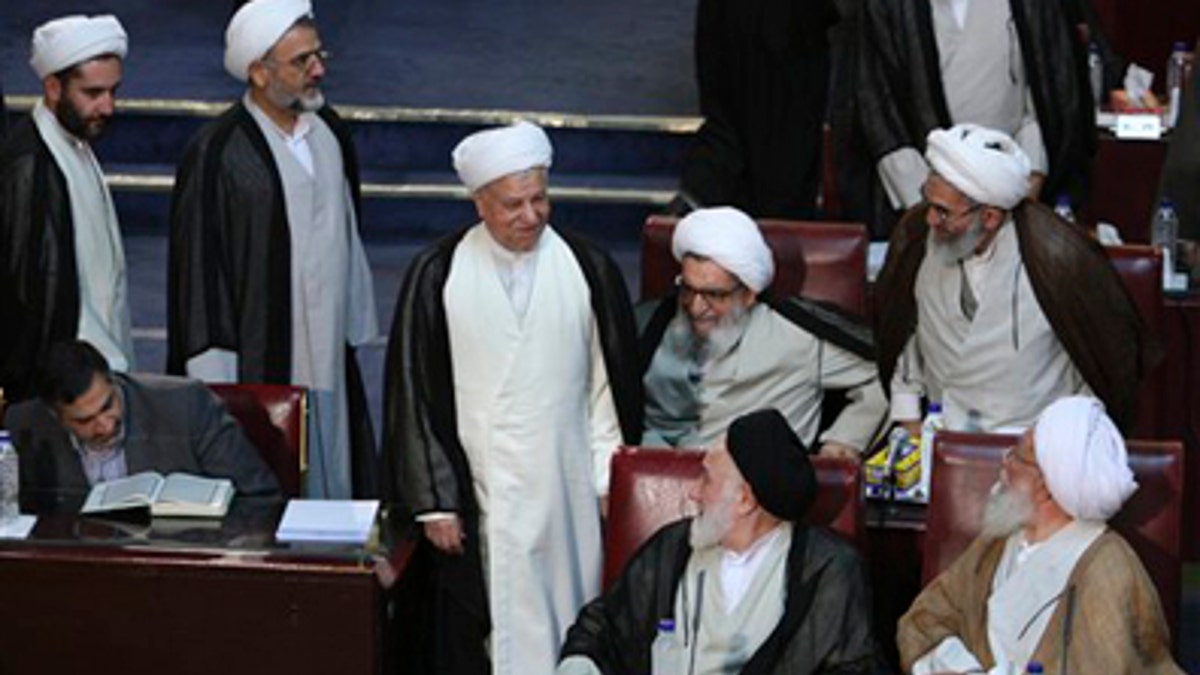
Tuesday: Former influential President Akbar Hashemi Rafsanjani, center, a member of Iran's Experts Assembly, arrives to attend the assembly's seasonal meeting, in Tehran, Iran. The Experts Assembly is a powerful clerical body with the right to monitor the performance of Iran's supreme leader. (AP)
U.S. military commanders and intelligence officers are pushing for greater authority to conduct covert operations to thwart Iranian influence in neighboring Iraq, according to officials quoted Tuesday.
The move comes amid growing concern in the Obama administration about Iran's attempts in recent months to expand its influence in Iraq and the broader Middle East and what it says is Tehran's increased arms smuggling to its allies, The Wall Street Journal reported.
Compounding the urgency is the planned reduction in the US military presence in Iraq by the end of the year, a development that many fear will open up the country to more influence from Iran, which also has a majority Shiite population.
If the request is approved by the White House, the authorization for the covert activity in Iraq likely would take the form of a classified presidential "finding." But unlike the secret order that authorized the CIA's campaign against Al Qaeda in 2001, the current proposal is limited in scope, officials said.
Still, such a step would reflect the U.S.'s effort to contain Iranian activities in the region. Ending the U.S.'s involvement in the Iraqi conflict was a central promise of President Obama's 2008 campaign, and the administration wants to ensure it doesn't withdraw troops only to see its main regional nemesis, Iran, raise its influence there.
Officials declined to provide details about the kinds of covert operations under consideration, but said they could include more aggressive interdiction efforts at the Iraq-Iran border and stepped-up measures to stop Iranian arms smuggling after the American drawdown.
The United Nations has blocked Iran from exporting sophisticated arms, guided missiles and nuclear technology. U.N. resolutions don't ban small arms exports or the kind of primitive weapons Tehran has provided Shiite militias in Iraq, defense officials said.
The U.S. has conducted secret operations against Iran in Iraq before. In recent months its military has quietly boosted efforts to capture Iranian agents and intercept Iranian munitions in Iraq. The U.S. government conducts covert operations when it wants to maintain the ability to deny a secret mission took place for security or diplomatic reasons.
The White House has become more worried about Iranian meddling in Iraq, Syria and Bahrain in recent months and has pushed the military and intelligence communities to develop proposals to counter Tehran.
In Iraq, U.S. officials say they have evidence that Iran has been providing Shiite militias with more powerful weapons and training, helping to increase the lethality of their attacks against U.S. forces -- in particular, with the crude but deadly IRAM, or improvised rocket-assisted munitions.
Iran also has stepped up its support of the embattled Syrian government, providing equipment and technical know-how for the crackdown on antiregime protests and has provided backing to Shiite protesters in Bahrain, officials say.
Iranian officials have repeatedly denied that they have played any role in arming militants in Iraq or worked to destabilize other Arab nations. Tehran has claimed the U.S. has leveled charges of arms smuggling to justify a continued American military presence.
Anthony Cordesman, a defense analyst at the Center for Strategic and International Studies, said the U.S. and Iranian competition for influence in Iraq was part of an attempt by both countries to preserve their interests in the Middle East amid a reordering of interests under the Arab Spring revolutions.
"From a U.S. viewpoint, containing Iran is critical and our strategic relationship with Iraq is critical," Cordesman said. "This is one set of moves in a much more complicated chess game."












































